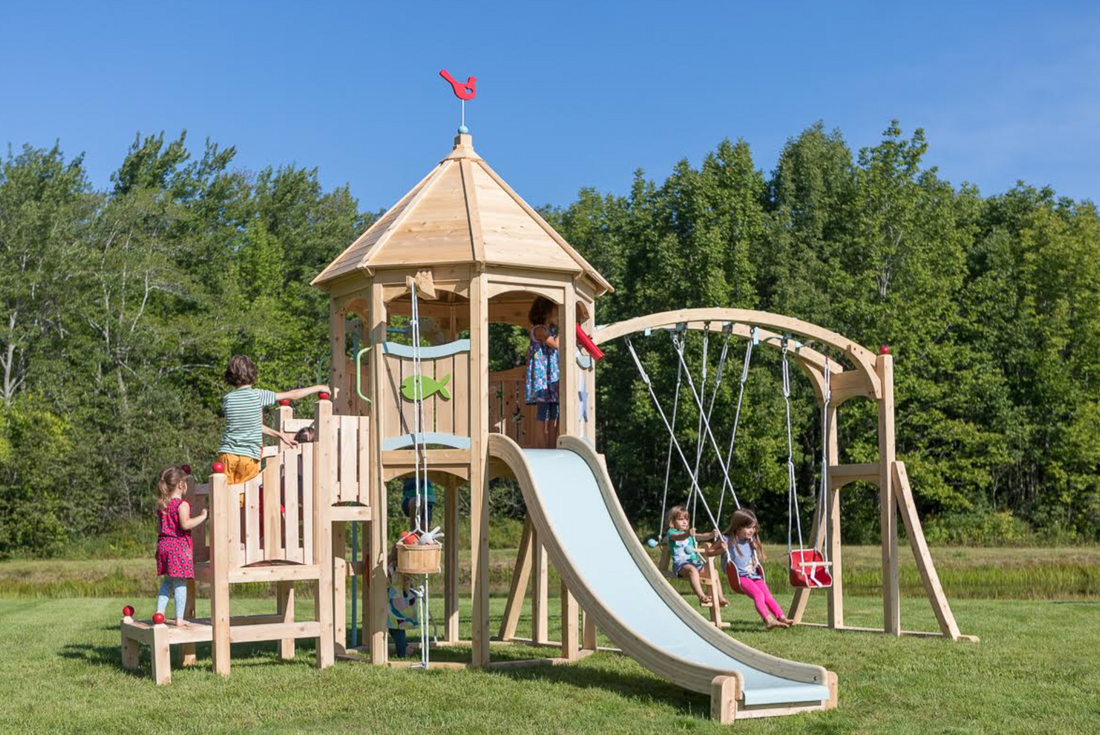
Eight Ways to Encourage Independent, Unstructured Play
“Play is often talked about as if it were a relief from serious learning. But for children, play is serious learning. Play is really the work of childhood.” – Fred Rogers

As a maker of playsets and “expert in play”, CedarWorks believes that while play is, first and foremost, fun, it is also important work. As the great Mr. Rogers would agree, a child’s job is play. It is vital to their physical, social, and cognitive development.
Play is how children explore their world, practice making and following rules, learn how to get along with others, enhance their problem-solving skills, and develop both their gross and fine motor skills. Studies have even found that kids who enjoy regular active play do better in school.
When we talk about play, we mean active, unstructured play rather than sports practices or structured play groups. Those are also worthwhile, of course, providing lots of benefits, but they don’t provide all the opportunities for problem-solving or using one’s imagination or even the self-governance that unstructured play provides.
During unstructured play, children can be active and get exercise, while also learning to work and cooperate with others. When you hear kids discussing, maybe even arguing over, the rules of a game they just made up, they are in the process of learning to negotiate and to compromise - after all, if you want to keep a good game going, you sometimes have to accept that not everything will go your way.
This kind of play also helps kids develop creativity and problem-solving skills as they use their imaginations to create games and invent new scenarios in which they might do anything from fending off pirates to running an ice cream shop. A child sprinkling sand on an imaginary ice cream cone is learning to think quickly and respond to a playmate’s “chocolate ice cream with sprinkles” order. Unstructured play creates opportunities for kids to use both their imaginations and their bodies to practice and solve problems on their own.
How can you encourage active, unstructured play for your children?
- Limit your child’s screen time. No judgement here! Most of us need to allow our kids some time on a tablet or phone, especially these days of working or schooling at home, but if a kid is immersed in their screen world, they aren’t going to want to play outside. Active play requires a certain amount of effort, and a screen is just too easy a distraction.
- Make sure to leave unscheduled blocks of time every week, preferably every day, where kids don’t have any planned activities. Unstructured play requires unstructured time.
- Get outside. Whether it’s to play in the backyard or walk to the park or explore at the beach, the outdoors encourages activity. Draw hopscotch on the driveway, make an obstacle course in the yard, or go on a treasure hunt in the woods. Or just let kids do their own thing. The other day a group of kids was playing on a pebble beach. From a distance, the game seemed to consist of yelling then taking turns throwing pebbles in the water. It was impossible to tell the object of the game, but they all seemed to understand the “rules”, and they were clearly having a great time.
- Don’t step in too quickly to solve problems. This can be a tough one for us parents when we hear “she’s not playing by the rules” or “he’s being bossy”, but wait a minute to see if they can figure things out on their own before you offer to referee. Disagreements or lulls in the action are inevitable when kids play together. How they deal with them is a big part of their development. If children are invested in a game, they will be motivated to keep it going. You might be surprised to hear them negotiating new rules that work for everyone.
- Let them get messy. Encourage it even. Kids will have an easier time immersing themselves in play if they know they aren’t going to get in trouble for getting dirty knees or paint on their hands.
- Let them be bored. Many of the best games start with boredom. If kids aren’t provided with an activity, they have to use their own creativity which tends to more engrossed play.
- Provide open ended toys or craft supplies. At CedarWorks, our playsets are equipped with fun accessories from swings to climbing walls to slides, all designed to encourage active play, but we steer away from making playsets look too much like any one thing. We think it’s better for kids’ imaginations to fill in the blanks themselves. Our Crow’s Nest, a high, enclosed deck that juts out from the main structure, may evoke a ship’s lookout, but it could also be a castle tower or a hiding place. Any structure with decks and sides can be a clubhouse or a submarine or even a rocket ship. A slide can be an escape hatch, monkey bars the only way to cross over quicksand. The point is not to restrict a child’s imagination. On a simpler note, offer blocks that they can build into anything they dream up or basic art supplies that they can use as they please, and try steering away from the kind of building kit or craft activity that is only meant to create one specific thing. Those can be fun, and they can help kids learn how to follow directions, but they don’t allow for much creativity.
- Adjust your expectations. Your child will not immediately be able to spend hours playing on their own. Most of us, kids and adults, don’t have much practice entertaining ourselves. As your child gets more used to unstructured play, and gets a repertoire of independent activities, they will play for longer periods of time.

If you’ve ever watched children really focused on a game and thought, “wow, those kids are playing like it’s their job,” it’s because playing is their job, probably their most important job. Our job, as parents, is to support them.
~Kristin Sidwell, CedarWorks
CedarWorks designs and manufactures beautiful, environmentally responsible products for active play including outdoor and indoor playsets and playhouses, https://www.cedarworks.com/
To learn more about the importance of play, check out these resources and articles
- Strong National Museum of Play
- Parents, “The Importance of Play”
- Bright Horizons, “The Benefits of Play for a Child’s Development”
- The Genius of Play, “6 Benefits of Play”
No comments







0 comments